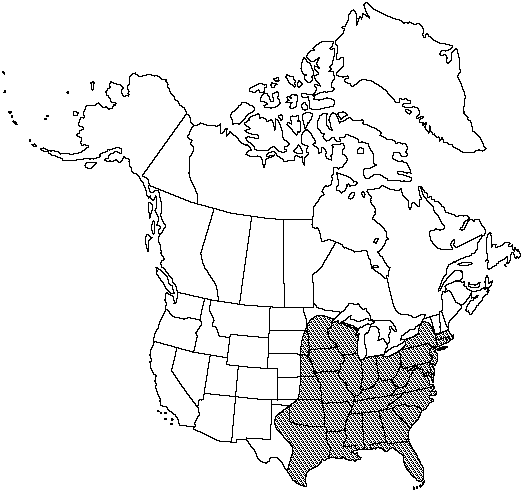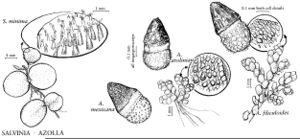Difference between revisions of "Azolla caroliniana"
Sp. Pl. 5(1): 541. 1810.
FNA>Volume Importer |
FNA>Volume Importer |
||
| Line 21: | Line 21: | ||
|habitat=Stagnant or slow-moving water in ponds, lakes, marshess, swamps, and streams. | |habitat=Stagnant or slow-moving water in ponds, lakes, marshess, swamps, and streams. | ||
|distribution=Ont.;Ala.;Ark.;Conn.;Del.;Fla.;Ga.;Ill.;Ind.;Kans.;Ky.;La.;Md.;Mass.;Mich.;Mo.;Nebr.;N.J.;N.Y.;N.C.;Ohio;Okla.;Pa.;S.C.;S.Dak.;Tenn.;Tex.;Va.;W.Va.;Mexico;West Indies;South America;Europe;Asia. | |distribution=Ont.;Ala.;Ark.;Conn.;Del.;Fla.;Ga.;Ill.;Ind.;Kans.;Ky.;La.;Md.;Mass.;Mich.;Mo.;Nebr.;N.J.;N.Y.;N.C.;Ohio;Okla.;Pa.;S.C.;S.Dak.;Tenn.;Tex.;Va.;W.Va.;Mexico;West Indies;South America;Europe;Asia. | ||
| − | |discussion=<p>The sporophyte of Azolla caroliniana commonly survives throughout the year in temperate areas (with hard frosts and prolonged ice cover). It is the best adapted of all species for subsistence on mud. Azolla caroliniana is rarely collected with sporocarps.</p> | + | |discussion=<p>The sporophyte of <i>Azolla caroliniana</i> commonly survives throughout the year in temperate areas (with hard frosts and prolonged ice cover). It is the best adapted of all species for subsistence on mud. <i>Azolla caroliniana</i> is rarely collected with sporocarps.</p> |
|tables= | |tables= | ||
|references= | |references= | ||
| Line 43: | Line 43: | ||
|publication year=1810 | |publication year=1810 | ||
|special status= | |special status= | ||
| − | |source xml=https://jpend@bitbucket.org/aafc-mbb/fna-data-curation.git/src/ | + | |source xml=https://jpend@bitbucket.org/aafc-mbb/fna-data-curation.git/src/8f726806613d60c220dc4493de13607dd3150896/coarse_grained_fna_xml/V2/V2_675.xml |
|genus=Azolla | |genus=Azolla | ||
|species=Azolla caroliniana | |species=Azolla caroliniana | ||
Revision as of 15:50, 18 September 2019
Plants dark green or with margins of bright crimson or whole plants dark red, free-floating or forming multilayer mat to 4 cm thick under good conditions; plants infrequently fertile. Stems prostrate, 0.5–1 cm. Largest hairs on upper leaf lobe near stem with 2 or more cells; broad pedicel cell often 1/2 or more height of hair, apical cell curved, with tip nearly parallel to leaf surface. Megaspores without raised angular bumps or pits, densely and uniformly covered with tangled filaments.
Habitat: Stagnant or slow-moving water in ponds, lakes, marshess, swamps, and streams.
Distribution

Ont., Ala., Ark., Conn., Del., Fla., Ga., Ill., Ind., Kans., Ky., La., Md., Mass., Mich., Mo., Nebr., N.J., N.Y., N.C., Ohio, Okla., Pa., S.C., S.Dak., Tenn., Tex., Va., W.Va., Mexico, West Indies, South America, Europe, Asia.
Discussion
The sporophyte of Azolla caroliniana commonly survives throughout the year in temperate areas (with hard frosts and prolonged ice cover). It is the best adapted of all species for subsistence on mud. Azolla caroliniana is rarely collected with sporocarps.
Selected References
None.
